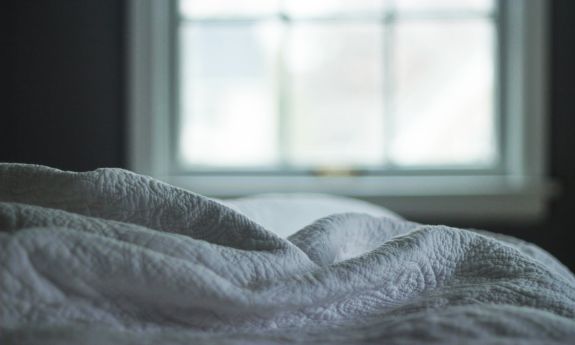How to Beat the Hurdles to a Good Night’s Sleep
Effectively managing bedtime and other tips for improving mental and physical well-being

Find Health and Wellness Tips On-Demand
Check out on-demand LIVE FOR LIFE health and wellness webinars on a variety of topics, including improving your sleep.
The Centers for Disease Control and Prevention recommends that adults get seven or more hours per night. According to the 2024 State of Sleep report from U.S. News & World Report, 30% of U.S. adults say they do not get enough sleep. Research shows that insufficient sleep can lead to increased risk of hypertension, diabetes, obesity, depression, heart attack and stroke.
“I think as a society, we undervalue sleep,” said Duke Associate Professor for Psychiatry and Behavioral Sciences Jessica Lunsford-Avery, who researches the role sleep plays in mental health. “If we can increase the prioritization of sleep, it can have a lot of benefits for us both in health and how we feel during the day.”
Lunsford-Avery said there are several common obstacles we face when trying to improve our sleep. With insight from her and Neuweg, here are a few ways to overcome the pitfalls from getting the sleep we need.

Slow Down Your Nights
Our ability to fall asleep at night is greatly affected by how we handle our evenings.
To improve his sleep, Neuweg altered his evening routines, setting a strict bedtime of around 9:30-10 p.m. and making sure he didn’t eat or drink in the roughly two hours beforehand.
When facing sleep issues, Lunsford-Avery said it’s important to plan calmer evenings and avoid sleep-inhibiting behaviors in the evening, such as consuming caffeinated drinks, exercising too close to bedtime and drinking alcohol, which can get in the way of deep restorative sleep.
To make earlier bedtimes a habit, Lunsford-Avery recommends adhering to a set bedtime routine consisting of a series of activities, such as brushing your teeth, changing into comfortable clothes and reading a book.
“Doing these things in the same order over a period of time can train our brain to know when it’s time to shut down,” Lunsford-Avery said. “Thinking about bedtime in a structured way is a small change that can make a big difference.”
Avoid Naps
Lunsford-Avery said short naps – in the 15-20 minute range – can be beneficial when trying to overcome a lack of restful sleep. But longer naps drain what Lunsford-Avery called your “sleep drive,” or how much your body needs to go to sleep.
“For people having difficulty falling asleep at night, we’ll often recommend backing off from naps for a little while,” Lunsford-Avery said.
Stay Consistent on Weekends
The enemy of reliable sleep is inconsistency.
Lunsford-Avery said deviating from our weeknight sleep routines on the weekends can derail consistency, interfere with healthy sleep habits and leave people feeling tired.
“Let’s say that on the weekend, I go to bed two hours later and I wake up two hours later, that’s like asking my body to operate like it’s in Denver’s time zone a few times a week,” Lunsford-Avery said. “Basically, I’m jet-lagging my body twice a week and I will feel those effects.”
While Lunsford-Avery said some deviation on the weekends is OK, it’s important to keep it in moderation so as not to undo progress made during the week.

Ditch the Devices
In U.S. News & World Report’s 2024 State of Sleep report, 44% of survey respondents said that screen time in bed is one of their worst sleep habits.
Before he adjusted his sleep routines, Neuweg said he was guilty of spending too much time on his phone in bed. Now, after cutting down on his device usage, Neuweg has been able to reliably make it to early morning sessions with F3, a free, volunteer-led workout group.
“It’s very easy to get on Facebook or YouTube and fall down some rabbit hole and next thing you know, you’ve chewed up like 45 minutes and you’re frustrated because you can’t fall asleep,” Neuweg said.
Experts, including Lunsford-Avery, said that staying off phones at bedtime is a challenging-but-important step toward getting consistent sleep.
LIVE FOR LIFE, Duke’s employee wellness program, addressed this issue in its Savvy Sleeper webinar, which is archived and available on demand. Among the strategies offered for keeping your smartphone from interfering with sleep are charging your phone away from your bed, adjusting your settings to silence notifications around bedtime and, if you must use your phone at night, dim the light on the screen using a nighttime filter.
“It’s helpful to get your phone out of your bedtime routine,” Lunsford-Avery said. “It’s not easy, but if you can do it, it can have a big effect.”
Send story ideas, shout-outs and photographs through our story idea form or write working@duke.edu.
Follow Working@Duke on X (Twitter), Facebook, and Instagram.